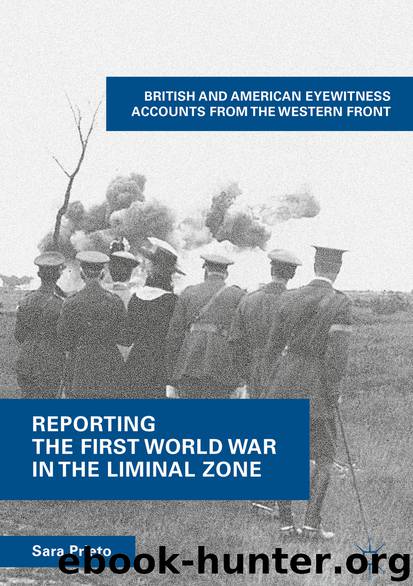Reporting the First World War in the Liminal Zone by Sara Prieto

Author:Sara Prieto
Language: eng
Format: epub
Publisher: Springer International Publishing, Cham
This chapter explores how the Battle of the Somme was represented in the accounts of three officially accredited correspondents: William Beach Thomas’s With the British on the Somme, Basil Clarke’s My Round of the War, and Harry Perry Robinson’s The Turning Point: The Battle of the Somme.5 I shall discuss the journalists’ performance in relation to the theories of liminality that are central to the argument of this book. According to Bjørn Thomassen, “in liminal passages, liminality is followed by reintegration rituals that re-establish the order of the new personality as a part of the social order that he or she re-enters with a new role, stamped by the formative experience” (Thomassen 2009, p. 22). The war correspondents had spent the first year and a half of the war as outlaws and outcasts, but from June 1915 onwards they had been gradually assimilated into the established military order. In view of this fact, one would expect their writing to shift towards a more propagandistic tone, in keeping with the military discourse impressed on them by the Army. But do their texts really confirm this assumption? In other words, do their narratives show them acting as “reintegrated” individuals? In terms of the liminal experience, could we claim that these reporters were truly at the end of a rite of passage?
It is my proposition that the war correspondents neither acted as truly assimilated individuals nor are their eyewitness accounts an obvious reflection of their newly acquired status. There are two a priori considerations that support this claim. The first one has to do with the time of publication of their accounts: the books under examination were published by the end of 1916, the middle year of the conflict. They coincide with what Robinson has referred to as “the turning point” of the war. Consequently, the reporters could not represent the war as if they were writing from the end of the “tunnel of liminality.” Instead, it would be more accurate to consider this period as a second stage in the reporters’ rite of passage. This stage may present some particular characteristics that are clearly distinguished from the first phase, as experienced by war reporters at the beginning of the war.
Secondly, considering the reporters’ position as official eyewitnesses of the conflict, their texts are liminal on a personal level as well. Just like Bennett, Conan Doyle, and Kipling, the journalists under consideration in this chapter were placed under the supervision of their instructors. As an “appendage of the Army,” they became apparently passive and malleable, two of the features that shape, in Turner’s terms, the liminal process.6 Their newly acquired status also resembles that of a neophyte, for the reporters had been “divested of their previous habits of thoughts, feeling, and action” and were “forced and encouraged to think about their society, their cosmos and the powers that generate and sustain them” (Turner 1967, p. 53). The reporters were writing from an in-between position: they were neither civilians nor members of the military. In consequence, evidence of a liminal status must be expected to emerge in their accounts.
Download
This site does not store any files on its server. We only index and link to content provided by other sites. Please contact the content providers to delete copyright contents if any and email us, we'll remove relevant links or contents immediately.
| Africa | Americas |
| Arctic & Antarctica | Asia |
| Australia & Oceania | Europe |
| Middle East | Russia |
| United States | World |
| Ancient Civilizations | Military |
| Historical Study & Educational Resources |
Cat's cradle by Kurt Vonnegut(15344)
Pimp by Iceberg Slim(14494)
4 3 2 1: A Novel by Paul Auster(12382)
Underground: A Human History of the Worlds Beneath Our Feet by Will Hunt(12094)
The Radium Girls by Kate Moore(12022)
Wiseguy by Nicholas Pileggi(5776)
The Fire Next Time by James Baldwin(5434)
Perfect Rhythm by Jae(5400)
American History Stories, Volume III (Yesterday's Classics) by Pratt Mara L(5303)
Paper Towns by Green John(5185)
Pale Blue Dot by Carl Sagan(5003)
A Higher Loyalty: Truth, Lies, and Leadership by James Comey(4958)
The Mayflower and the Pilgrims' New World by Nathaniel Philbrick(4498)
The Doomsday Machine by Daniel Ellsberg(4489)
Killers of the Flower Moon: The Osage Murders and the Birth of the FBI by David Grann(4447)
The Sympathizer by Viet Thanh Nguyen(4387)
Too Much and Not the Mood by Durga Chew-Bose(4344)
The Borden Murders by Sarah Miller(4319)
Sticky Fingers by Joe Hagan(4193)
